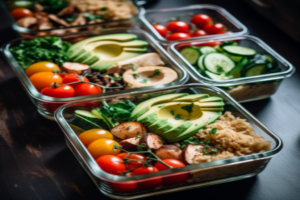Introduction:
Maintaining a healthy diet can be challenging for busy individuals, but with proper meal prep, it becomes easier to make nutritious choices even on the busiest of days. Meal prepping involves preparing meals and snacks in advance, saving time, and ensuring you have healthy options readily available. In this article, we will provide a variety of healthy meal prep ideas suitable for busy individuals. These ideas will help you save time, promote a balanced diet, and support your overall well-being.
Plan and Prep Your Meals:
a. Set aside time for meal planning: Dedicate some time each week to plan your meals. Consider your schedule, dietary preferences, and nutritional needs when selecting recipes.
b. Create a shopping list: Based on your meal plan, create a detailed shopping list. This will help you stay organized and avoid unnecessary trips to the grocery store.
c. Prep ingredients in advance: On a designated day, wash, chop, and prepare ingredients that can be stored in the refrigerator. This includes washing and slicing vegetables, cooking grains, and marinating proteins.
Breakfast Ideas:
a. Overnight oats: Prepare individual portions of overnight oats by combining rolled oats, milk (or plant-based alternative), chia seeds, and your choice of toppings like fruits, nuts, or spices. Refrigerate overnight, and grab them in the morning for a quick and nutritious breakfast.
b. Egg muffins: Beat eggs and pour them into muffin tins filled with chopped vegetables, lean meats, and cheese. Bake until set, and store them in the refrigerator. Enjoy one or two muffins as a protein-packed breakfast option.
c. Smoothie packs: Create smoothie packs by pre-portioning fruits and vegetables in freezer bags. In the morning, simply blend the contents of the pack with a liquid of your choice, such as almond milk or yogurt, for a refreshing and nutritious breakfast.
Lunch and Dinner Ideas:
a. Mason jar salads: Layer mason jars with salad ingredients, starting with the dressing at the bottom and building upwards with vegetables, protein (such as grilled chicken or beans), and leafy greens. Seal the jars and refrigerate. When ready to eat, shake the jar to distribute the dressing and enjoy a fresh and portable salad.
b. Stir-fries: Prepare a large batch of stir-fried vegetables and lean proteins, such as chicken, tofu, or shrimp. Portion them into individual containers with cooked brown rice or quinoa for a balanced lunch or dinner option.
c. Roasted vegetables and protein: Roast a variety of vegetables, such as broccoli, carrots, and sweet potatoes, alongside proteins like salmon, chicken breast, or tofu. Divide them into individual containers and pair with a side of whole grains for a wholesome meal.
d. Slow cooker or Instant Pot meals: Utilize a slow cooker or Instant Pot to prepare dishes like chili, soups, or stews. These appliances allow for hands-off cooking, making it convenient for busy individuals. Portion out the cooked meals into containers for quick and satisfying lunches or dinners.
Snack Ideas:
a. Energy balls: Prepare a batch of energy balls using a combination of dates, nuts, seeds, and flavorings like cocoa powder or vanilla extract. Store them in the refrigerator for a grab-and-go snack that provides energy and nutrients.
b. Veggie sticks and hummus: Cut up a variety of vegetables such as carrots, cucumbers, and bell peppers. Pair them with individual portions of hummus for a nutritious and satisfying snack.
c. Yogurt parfaits: Layer individual containers with Greek yogurt, fruits, and granola. Refrigerate the parfaits and enjoy them as a healthy snack or dessert option.
d. Pre-portioned nuts and seeds: Measure out individual portions of nuts and seeds, such as almonds, walnuts, or pumpkin seeds, and store them in small containers or resealable bags. These provide a convenient and nutritious snack option.
Tips for Successful Meal Prep:
a. Invest in quality food storage containers: Use a variety of containers that are both microwave and dishwasher safe. Ensure they have secure lids to prevent leaks and maintain freshness.
b. Label and date your meals: Clearly label each container with the name and date of preparation to ensure you consume meals within their recommended freshness.
c. Rotate your recipes: Keep your meals interesting by rotating recipes and ingredients each week. This will help prevent boredom and allow you to explore different flavors and cuisines.
d. Utilize the freezer: Some meals and ingredients can be frozen for longer-term storage. Consider batch cooking and freezing individual portions for busy days when you don’t have time to prep.
Conclusion:
Healthy meal prep is a valuable tool for busy individuals looking to maintain a nutritious diet. By planning and prepping your meals in advance, you can save time, ensure balanced nutrition, and avoid relying on unhealthy convenience options. From breakfast ideas like overnight oats to lunch and dinner options like mason jar salads and stir-fries, there are numerous possibilities for delicious and nourishing meals. Incorporating snack ideas and following meal prep tips will contribute to a stress-free lifestyle and support your overall well-being.







